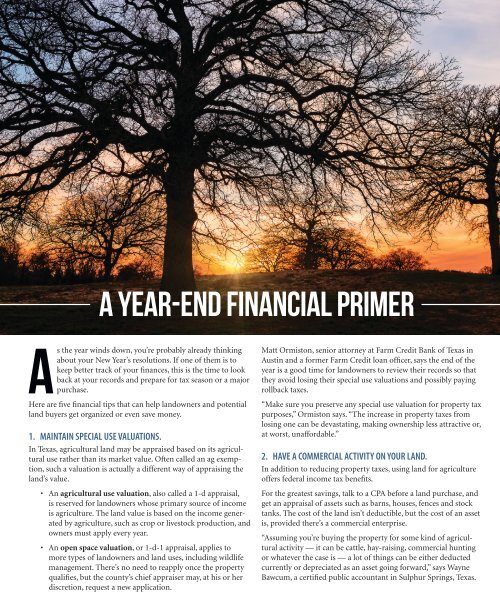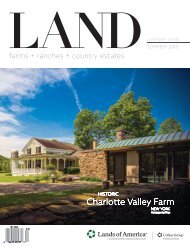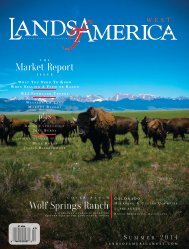Create successful ePaper yourself
Turn your PDF publications into a flip-book with our unique Google optimized e-Paper software.
A Year-End Financial Primer<br />
s the year winds down, you’re probably already thinking<br />
about your New Year’s resolutions. If one of them is to<br />
keep better track of your finances, this is the time to look<br />
back at your records and prepare for tax season or a major<br />
purchase.<br />
Here are five financial tips that can help landowners and potential<br />
land buyers get organized or even save money.<br />
1. MAINTAIN SPECIAL USE VALUATIONS.<br />
In Texas, agricultural land may be appraised based on its agricultural<br />
use rather than its market value. Often called an ag exemption,<br />
such a valuation is actually a different way of appraising the<br />
land’s value.<br />
• An agricultural use valuation, also called a 1-d appraisal,<br />
is reserved for landowners whose primary source of income<br />
is agriculture. The land value is based on the income generated<br />
by agriculture, such as crop or livestock production, and<br />
owners must apply every year.<br />
• An open space valuation, or 1-d-1 appraisal, applies to<br />
more types of landowners and land uses, including wildlife<br />
management. There’s no need to reapply once the property<br />
qualifies, but the county’s chief appraiser may, at his or her<br />
discretion, request a new application.<br />
Matt Ormiston, senior attorney at Farm Credit Bank of Texas in<br />
Austin and a former Farm Credit loan officer, says the end of the<br />
year is a good time for landowners to review their records so that<br />
they avoid losing their special use valuations and possibly paying<br />
rollback taxes.<br />
“Make sure you preserve any special use valuation for property tax<br />
purposes,” Ormiston says. “The increase in property taxes from<br />
losing one can be devastating, making ownership less attractive or,<br />
at worst, unaffordable.”<br />
2. HAVE A COMMERCIAL ACTIVITY ON YOUR LAND.<br />
In addition to reducing property taxes, using land for agriculture<br />
offers federal income tax benefits.<br />
For the greatest savings, talk to a CPA before a land purchase, and<br />
get an appraisal of assets such as barns, houses, fences and stock<br />
tanks. The cost of the land isn’t deductible, but the cost of an asset<br />
is, provided there’s a commercial enterprise.<br />
“Assuming you’re buying the property for some kind of agricultural<br />
activity — it can be cattle, hay-raising, commercial hunting<br />
or whatever the case is — a lot of things can be either deducted<br />
currently or depreciated as an asset going forward,” says Wayne<br />
Bawcum, a certified public accountant in Sulphur Springs, Texas.
















